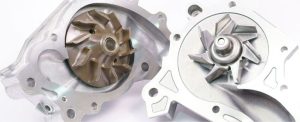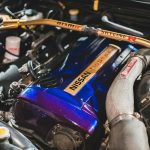
Your water pump is an integral part of your engine and is vital to its performance. When your engine is running, the water pump forces liquid coolant to circulate through the engine water jackets (internal passages in the engine). This pump is usually driven by the engine itself by a belt that is connected to the crankshaft pulley and sometimes the timing chain. There is a central shaft inside the water pump that transfers the turning force of the engine to the impeller. This impeller is a disk with fan-like blades that spins and produces pressure and flow. Water pump impellers can be made of steel or plastic and may be curved or straight. The coolant trapped between the impeller blades is thrown outward by centrifugal force. This produces suction in the central area of the pump house and pressure in the outer area of the housing. Since the pump inlet opening is near the center, coolant is pulled out of the radiator, through the lower hose, and into the pump. After being thrown outward and pressurized, the coolant flows into the engine. It circulates through the block, around the cylinders, up through the cylinder head(s), through the thermostat, and back into the radiator.

An electric water pump uses a large dc motor and an impeller to force coolant through the engine’s water jackets or through the cooling system. This style of pump replaces a belt-driven water pump. The assembly often bolts to the side of the engine and has one radiator hose connected to it. When the engine control unit senses that the engine has reached a predetermined operating temperature, it energizes the electric water pump to maintain the correct engine temperature. Since the electric water pump does not turn until needed, it allows the engine to reach operating temperature more quickly for improved efficiency. The speed of the electric water pump can also be controlled by the engine control unit to reduce energy consumption.
There is a larger system that the water pump is a part of for the cooling of the engine, and for more info, look at our Cooling system information here. This system uses a seemingly endless system of hoses, tubes, engine pathways, and many other things to keep coolant moving to where it needs to go.

No matter what type of engine you have, or the kind of water pump it uses, keeping your engine running at the correct temperatures will lengthen the life of your engine and keep things moving smoothly as long as possible. Familiarize yourself with the dashboard indicators of your vehicle and always give care to see the temperature gauge. If you notice anything unusual or extreme temperatures, give us a call at 314.423.3876 to schedule an appointment with our Service Advisor to have the water pump and the corresponding systems looked over visually for leaks, damaged hoses and belts, or anything that could be causing the issue. We want to keep you and your car from overheating over a damaged or inefficient water pump.
